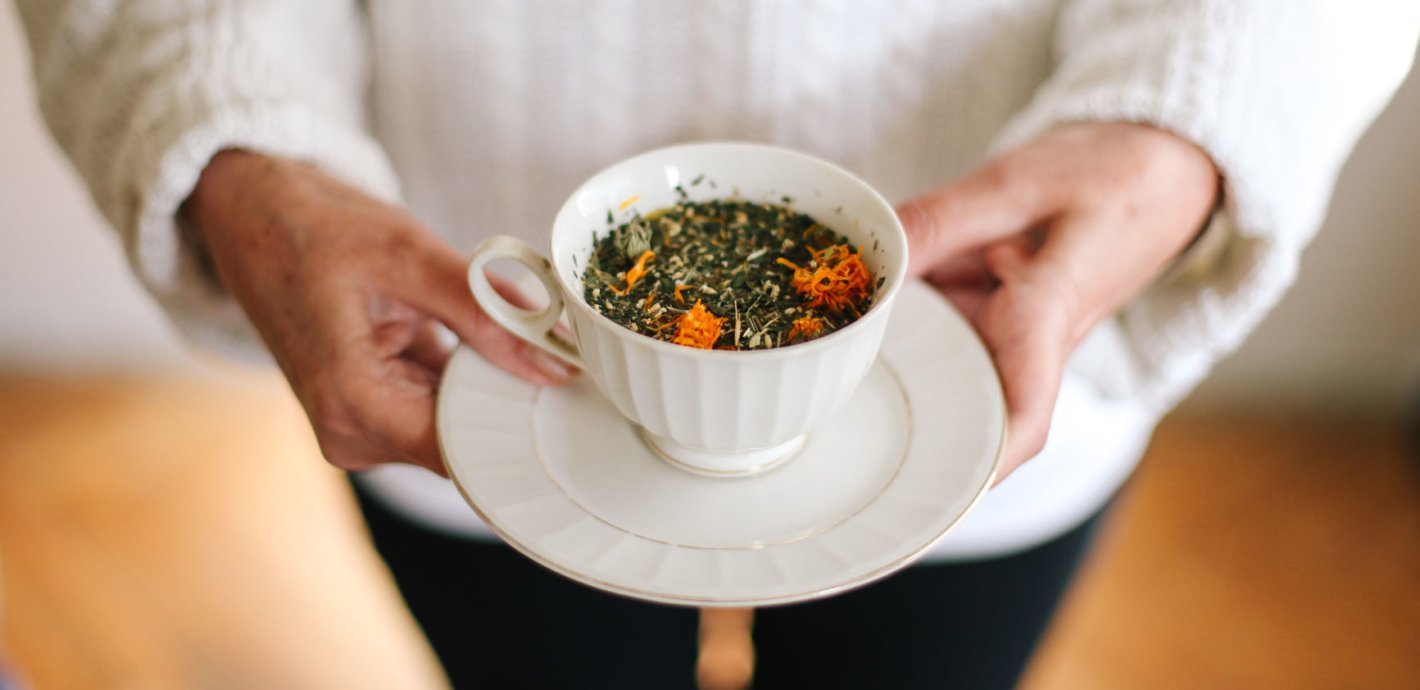Ayurveda has a long, rich history of using plants as medicine. And these days, traditional Ayurvedic herbs are getting lots of attention for their now science-backed benefits. But which ones should you try? Here, I’ll dive into the most essential Ayurvedic herbs, what they may help you address, and how they’re most commonly taken.
Before we get started, a word of caution: Even the first textbook of Ayurveda, which is from around 800 BC, says that herbs should not be administered or taken without proper knowledge. In other words, even though these herbs are mild and don’t have any major interactions with other medications, it’s better to consult with your healthcare practitioner before trying them out.
1. Amalaki (Emblica officinalis)
Amalaki, also called Indian gooseberry, is a fruit that is deeply connected to Indian culture and has been used for thousands of years for its rejuvenating properties. The Amalaki fruit is a very rich source of vitamin C, so it has the ability to protect the immune system. It’s especially recommended to take Amalaki during the fall season, since in Ayurveda, fall is when the body is most prone to inflammation.
Amalaki and Tulsi, the next herb on this list, are often taken together. Amalaki to calm the body, and Tulsi to calm the mind. Amalaki is also thought to be an anti-aging substance. There is a section in Ayurveda called rasayana, which deals with prevention of disease, promotion of health, and anti-aging. This section of Ayurvedic medicine starts with Amalaki.
It’s wonderful to take Amalaki every day in one form or another, and the most common formula is called chyawanprash, a jam that contains several other herbs as well. It can be taken by people of all ages and is a very mild supplement that can help nourish all seven tissues of the body.
2. Tulsi (Ocimum sanctum)
Tulsi, also known as holy basil, is a very mental and spiritually connected plant, which means that taking it can help calm and uplift the state of mind. In Ayurveda, it’s thought that it can help induce a positive mindset. This is why Tulsi tea is administered to help deal with anxiety. In research, tulsi has shown promising anti-stress and antidepressant properties.
Tulsi has also been shown to have anti-cancer properties and protective properties against autoimmune diseases. While that doesn’t necessarily mean Tulsi will cure or prevent diseases, it may slow the growth of cancer cells and reduce inflammation, which is linked to autoimmune health issues.
Tulsi is also used as a home remedy for cough, sore throat, and sinusitis. By crushing the leaves to make a tea, many people find relief. It can also be taken in capsule form.
3. Ashwagandha (Withania somnifera)
Out of all the herbs on this list, Ashwagandha is perhaps the most famous right now thanks to its status as an adaptogen—a substance that helps the body adapt to stress. It’s not just popular today; the herb is also highly regarded in the ancient texts.
Ashwa means “horse” and ghanda means “like.” So, basically, it makes you horse-like with strength and vitality, especially in males. Studies show that Ashwagandha helps increase testosterone in infertile men. It also helps to nourish and rejuvenate muscles, so it’s especially useful to those who are active. This is also thought to extend to joint health. For those who have pain or achiness in their joints, Ashwagandha is a great choice.
Ashwagandha has also been touted for its mental health benefits. It can be used to help ease anxiety and research suggests it may be helpful for those with depression, too.
Ashwagandha is mostly taken in powder or capsule form, but there’s also a jam with other herbs called Ashwagandha lehyam, which is even better for absorption. It’s also taken in a milk formula, preferably with cow’s milk, but any type of plant-based milk will work, too. The herb gets into the body quickly and efficiently in this form.
Related: The Healing Powers of Herbs and Spices
4. Brahmi (Bacopa monnieri)
Brahmi, or bacopa, is an herb that is primarily taken to enhance the mind and is considered one of the best preventative solutions for age-related memory problems in Ayurveda. For this reason, it’s taken by many people of all ages.
Brahmi is thought to enhance all of the aspects of the intellect, and it’s a good tonic to take for keeping the mind healthy and functioning. It’s also sometimes used for children with ADHD with promising results and can help with proper reasoning.
If you have sleep troubles, you may also consider taking Brahmi to help calm the mind before going to bed. Similarly, those with stress-induced stomach issues may find Brahmi helpful to relax the mind and, thus, the digestive system. This plant is taken in the form of either a tea or fresh herbs in a salad, and can be taken by people of any age.
5. Shatavari (Asparagus racemosus)
Shatavari can be used for both mind and body health. In particular, it has a very special connection to female health and fertility. Shata means “many,” and avari means “surrounded with babies.” So just the name of this herb gives us a clue that it is very good for the female reproductive system, encouraging a healthy, regular reproductive cycle.
It’s also sometimes used to increase breast milk in women who are breastfeeding, as well as in women who are going through menopause. Research has also shown that it may help women with polycystic ovary syndrome.
Shatavari may improve gut health, too, and could be useful for treating ulcers. It may ease acid reflux in both sexes as well.
Since Shatavari is a root vegetable, and it’s rich with antioxidants and anti inflammatory substances. So when taken, studies show it can enhance immune function, reduce oxidative stress, and help with lymphatic fluid and blood circulation. People usually take about half a teaspoon of Shatavari powder mixed with some kind of warm liquid. It can also be taken as a pill or in a ghee, the latter of which can improve absorption.









Comments (0)